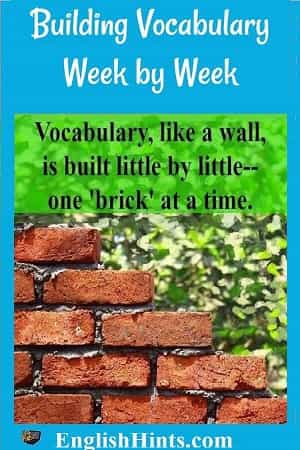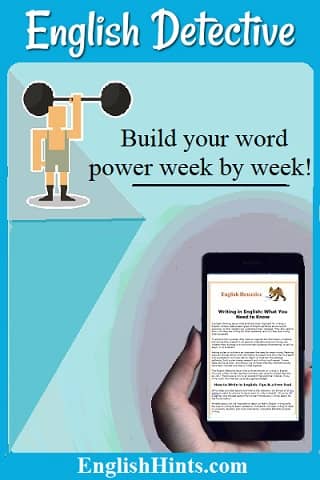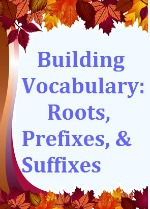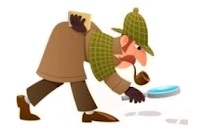Building Vocabulary Bit by Bit
You know building vocabulary in English is important. But it’s easy to put off because it seems too difficult.

Don’t give up! I started this website to help people with a little English learn more-- enough to use! (Maybe not quite a 'zillion' words, but thousands-- see below.)
The best way to learn vocabulary (and grammar, and gain fluency) is by listening and reading a lot.
There is so much good reading (sometimes with audio) available in English on the Internet! The problem is that it isn't so easy to find information at a level you can understand.
It's also important to read and hear the same words at least 6-10 times, according to experts. Then you will recognize them again when you see them later.
Would it help to have recommendations of appropriate reading material, chosen so you could see some of the same new words several times?
What about adding some practice activities and quizzes to reinforce and check your learning)?
Building Vocabulary with English Detective
English Hints has a free online newsletter for that very purpose.
Increase your vocabulary a little at a time, by reading interesting selections with a few less-common words each issue. (You’ll know many or most of them already, but that will help you understand the others.)
Get more comfortable reading English without spending hours searching for interesting articles. (You don't have to be stuck with reading that is TOO difficult or boring either.*)
Jump down to the sign up form here. Read on for more details and a free ebook on English word formation with roots and affixes.

*If you can read English at an intermediate level—B1 or B2 up-- you should be able to understand most articles.
Once (or sometimes twice) a month (usually on the 1st Tuesdays), I'll send links to one or more articles, talks, or podcasts on a subject-- or to a page on the subject.
I'll tell you a little about each, and sometimes discuss key vocabulary to review & practice.
Sometimes there's a crossword or other puzzle to practice it. (See Printable Crossword Puzzles for links to more.)
(If you would like more frequent practice, check out the Back Issues-- now over 100, Reading Articles to Improve English (with links to pages giving sharing more recent English Detective recommendations) or Comprehension Exercises.)
English Detective has emphasized topics from various fields important to school, tests (like the TOEFL or IELTS) or jobs.
Starting in 2020 its focus will especially be on science and medical research topics and on skills important for researchers.
(Important or less common words used several times are explained in the English Detective vocabulary section. Sometimes there's a crossword puzzle so you can match those words with easy-to-guess meanings instead.)
I check the vocabulary level of every article or talk I think about using in English Detective. I try to have a mix of short and longer articles. They're all written clearly, without too many idioms or difficult expressions.
The first 23 issues of English Detective taught and practiced the Academic Word List. (It's 570 very useful words. There's more information on the AWL here.) See the Back Issues or Academic Vocabulary Word Lists to study them.
Each of the 570 'words' of the AWL is actually a group of words with the same root. For example, see authority, authoritative, authoritarian, authorize, authorization-- all taught in issue 13.
So in those first 23 newsletter issues there were explanations and/or practice activities for close to 2,000 thousand individual words. Most recent issues highlight fewer words, but they add up, every issue.
Watch your vocabulary grow-- even as you review many of those basic academic words in new reading contexts.

Special Offer
You can get a bonus ebook free right now along with getting English Detective.
It's Building Vocabulary: Roots, Prefixes, and Suffixes. It includes lists of common prefixes, suffixes, and 80 of the most common Latin roots of English words. (150 of those words are from the Academic Word List.)
Print out what you need, and keep the rest on your computer for easy reference.
Of course, you won’t learn new words just by reading a list. Use these lists as background information. They can help with some of the new words you’ll read and practice in English Detective.
You can download this ebook as soon as you confirm your subscription to English Detective. (Sign up in the form below.) I hope you find these roots and affixes as helpful as I have!
Just think how much easier it will be to understand what you read in English in a few months!
Boost Your Vocabulary with English Detective
Sign up in the box below.
As I mentioned, I will not share your name or email address with anyone, and you can unsubscribe at any time.
*What’s next when you subscribe?
In a few minutes you should get a short email asking you to confirm your subscription. Why? To make sure that no one subscribed your email address without you knowing about it.
If you don't receive that email in the next 20-60 minutes, please check your Spam or Junk folder. If it's not in that folder, there was probably an error in the email address you entered. Please fill out the form and submit it again.
Once you confirm your subscription, you should get an email with a link to the page where you can download your free pdf. I hope you find it helpful!

Curious about Older Issues of English Detective?
A few of the topics for our first issues were detective methods (& how to investigate English words), the scientific method and the discovery of penicillin, and planning for success (while learning from failure.)
The first year and a half there were issues on the roots of English, bilingualism and the brain, the value of networks for creativity, community service, the environment, cognates, medical breakthroughs, and so much more!
You can see a review of some more recent issues here, and older back issues here. If you are interested in which issues teach particular words from the Academic Word List, or the reading selections, puzzles, and practice activities in any particular issue, you can find that information in Academic Vocabulary Word Lists in English Detective Issues.
For even more ways of building vocabulary, see Vocabulary Strategies.
Home> How to Learn Professional Vocabulary > Building Vocabulary Month by Month
Didn't find what you
needed? Explain what you want in the search box below.
(For example, cognates, past tense practice, or 'get along with.') Click to see the related pages on EnglishHints.
| site search by freefind | advanced |
